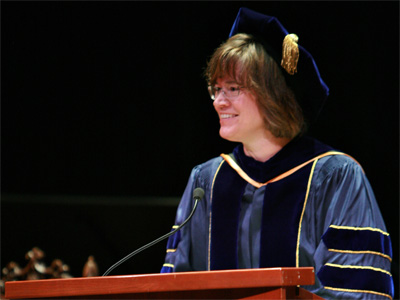 When I heard that “Genius of Women” was the theme of the inauguration of the eighth president of Scripps College, the phrase rang a bell. It was the theme of remarks made by Pope John Paul II in an encyclical addressed to the women of the world on the eve of the Fourth World Conference on Women in Beijing in 1995. For me, a feminist scholar of gender and women’s studies, the juxtaposition of these two events crystallizes the ambivalent gift lodged in our theme. On one hand, the genius of women sends a signal we should embrace. In overcoming obstacles like lack of access to education and professional training, we have produced work that merits the name of genius. On the other, for Pope John Paul, the genius of women lies in female service and obedience. I can hardly accuse the pope of disrespecting women — after all, Mary is his model for the genius of womanhood — but let’s recognize that the feminists gathered in Beijing affirmed a wider scope for women.
When I heard that “Genius of Women” was the theme of the inauguration of the eighth president of Scripps College, the phrase rang a bell. It was the theme of remarks made by Pope John Paul II in an encyclical addressed to the women of the world on the eve of the Fourth World Conference on Women in Beijing in 1995. For me, a feminist scholar of gender and women’s studies, the juxtaposition of these two events crystallizes the ambivalent gift lodged in our theme. On one hand, the genius of women sends a signal we should embrace. In overcoming obstacles like lack of access to education and professional training, we have produced work that merits the name of genius. On the other, for Pope John Paul, the genius of women lies in female service and obedience. I can hardly accuse the pope of disrespecting women — after all, Mary is his model for the genius of womanhood — but let’s recognize that the feminists gathered in Beijing affirmed a wider scope for women.
To unpack the ambivalent gift of the theme, I propose a close reading of the terms genius and women. First, genius. A marker of the highest intellectual and creative expression, inclusion in the world’s most select meritocracy, how could we not want to claim that? Women do and women should. But we should recall, too, that genius is a category firmly rooted in excluding “others” from its ranks. It is not simply that genius did not apply to anyone other than elite men, it is that the term only had value in conjunction with masculinity. It was nonsensical when applied to women and it gendered genius as masculine. Virginia Woolf considered the gendering of genius to be fatal. For her, genius was a third term, neither masculine nor feminine, but human. Women were oppressed precisely because they were women in ways that thwarted their human genius. But the conditions of oppression were not the source of their talents. Nor were men automatically geniuses due to any gene or trait or special condition. Some men have had access to millennia of training, opportunity, and made the most of this, while others have not.
“Genius” is one of those words with something of the Trojan horse about it: a desirable appearance with an enemy hidden inside. “Women” is, too. It has been used as an insult, a mark of degradation, a stigmatized position in culture. Women have even been required to argue their way into the category when forced outside it by slavery, racism, and homophobia. Sojourner Truth’s ringing question — “Ain’t I a woman?” — lets us see that being identified as “women” is hardly simple. It helps to remember that a woman in the 1920s in the U.S. with a brow furrowed in thought and ink stained fingers appeared to be as sex variant within the category of “women” as a transgendered Scripps student fully engaged in the conversation of what a women’s college can mean to him and all of us.
For my part, I embrace the ambivalent gift of the theme. I thank those who gave it to us so that we might contend with it and shape it to our own desires and ends. I look forward to celebrating the inauguration of Lori Bettison-Varga in the name of those who earned but have been denied the right to be called women of genius, as well as those who contend with the categories and seek freedom in the process.

